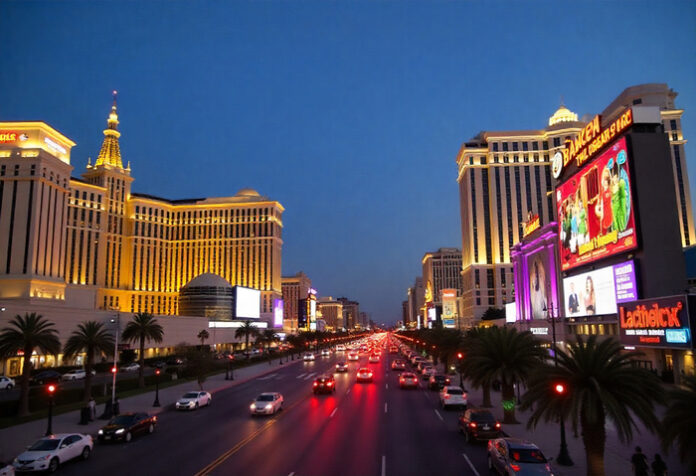Las Vegas Tourism Struggles with Nine-Month Decline
Las Vegas, known for its glitz, glamour, and vibrant nightlife, has recently encountered significant hurdles to its tourism sector. Throughout 2025, the city has witnessed a decline in visitor numbers over nine consecutive months, a stark contrast to its previous upward trajectory. This shift highlights the profound challenges brought about by rising travel costs, political strains, and a decrease in Canadian visitors, leading to questions about the city’s recovery strategies.
Rising Travel Costs Dampen Visitor Numbers
The most pressing challenge for Las Vegas tourism has been the escalation of travel expenses. Higher room rates and resort fees have made vacations in the city less affordable. Where once a trip to Las Vegas was a sought-after escape, the increasing costs have prompted many potential visitors to explore more budget-friendly alternatives. As a result, the city’s once-booming tourism market is beginning to suffer, with many second-guessing their travel plans based on financial considerations.
Political Tensions Affecting Canadian Visitors
Compounding the issue of rising costs are the political tensions between the United States and Canada. Traditionally, Canadian visitors have formed a significant demographic within Las Vegas’ tourist profile, contributing substantially to its economy. However, since the start of 2025, there has been a noticeable decline in Canadian visitors. Factors such as heightened tariffs, political friction, and economic uncertainty have led many Canadians to reconsider their travel ambitions to the U.S., negatively impacting tourism to Las Vegas.
As geopolitical dynamics shift, confidence in cross-border travel has wavered. Reports indicate that the number of Canadian tourists arriving by car has plummeted by over 38%, while air travel for leisure purposes has also significantly declined. This trend reflects a broader hesitation rooted in current affairs, which could have lasting consequences for the U.S. tourism sector.
Visitor Data Illustrating the Decline
Recent data from the Las Vegas Convention and Visitors Authority (LVCVA) paints a concerning picture. Total visitation has dwindled by 8.8% compared to the same period last year, particularly in the crucial convention segment, which has seen a staggering 19% reduction in attendance. Data points from January to September 2025 illustrate this decline:
- January: 3,344,600 visitors
- February: 2,973,300 visitors
- March: 3,386,800 visitors
- April: 3,335,900 visitors
- May: 3,418,700 visitors
- June: 3,094,800 visitors
- July: 3,089,300 visitors
- August: 3,171,500 visitors
- September: 3,091,400 visitors
These figures indicate a steady contraction in tourist footfall, alongside a five-percentage-point drop in hotel occupancy to 78.7%. Coupled with declining average daily room rates, this suggests a significant industry downturn, with revenue per available room dropping to $150, marking a 9% decline from the previous year.
The Aftermath on Casino Revenues
The impact of declining visitor numbers isn’t limited to just rooms and rates. Traditionally, the casino industry has been the cornerstone of the Las Vegas economy. However, operators have reported weakened gaming activity alongside lower guest turnout. This has resulted in diminished overall spending in entertainment and dining sectors, which often thrive on the influx of eager visitors.
Strategic Responses to the Tourism Decline
In response to these challenges, Las Vegas tourism authorities and resort operators are ramping up their marketing efforts. The LVCVA has launched campaigns designed to attract both domestic and international tourists, promoting Las Vegas as a vibrant, value-oriented destination despite economic challenges.
Simultaneously, casinos and resorts are introducing aggressive promotions to entice visitors back. Strategies include discounted stays, eliminated resort fees, free parking, and enticing loyalty incentives. Entertainment venues are also investing in high-profile events to rekindle excitement and draw crowds.
Obstacles to Recovery
Despite these proactive measures, analysts caution that the solutions may only provide temporary relief. Persisting inflation and rising airfares continue to act as deterrents for international travelers. Even domestic tourists are tightening their budgets, opting for shorter trips and destinations that offer more economical experiences.
The path forward may hinge not only on robust marketing but also on restoring confidence in the U.S. as a welcoming travel destination. Improving political relations with Canada, stabilizing air travel connections, and keeping travel costs affordable will be pivotal in steering the tourism sector towards recovery.
The Broader Tourism Landscape
As Las Vegas grapples with this downturn, it is indicative of broader trends affecting global tourism. International arrivals from Europe and Asia have softened as well, reflecting a significant dip in overseas tourism to the United States. Although some European markets have shown slight increases, overall figures still remain below those of 2024.
As Las Vegas strives to navigate this challenging landscape, the collaborative efforts of policymakers, travel industry stakeholders, and local businesses will be crucial in reviving the city’s tourism momentum. While Las Vegas is iconic for its luxury offerings and vibrant atmosphere, the current climate necessitates a reevaluation of strategies to adapt to a cautious travel market.
Las Vegas has long been a beacon of excitement, but as rising costs and geopolitical uncertainties linger, restoring its status as a must-visit destination in America may take more than quick fixes. Instead, it will require a concerted effort to foster a sense of security and attraction for travelers in an evolving global environment.
